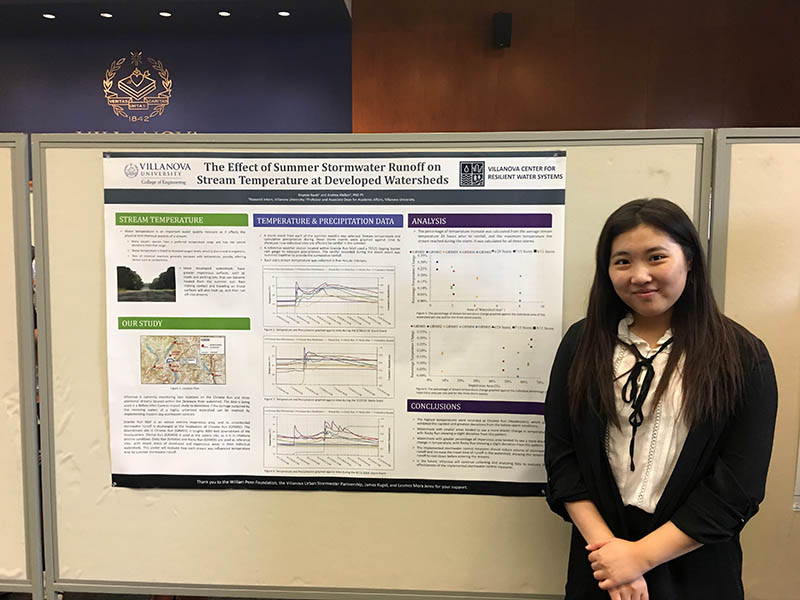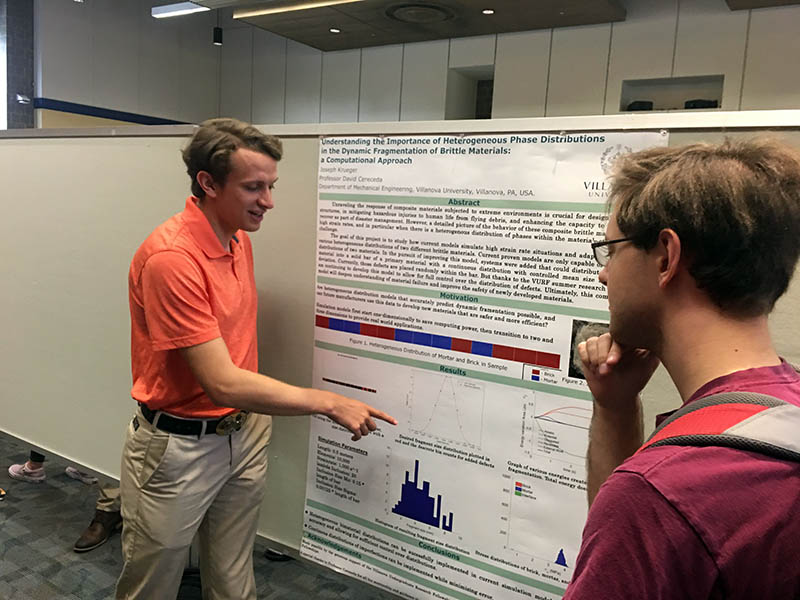Engineering Students Present at 2019 Research Symposium
by Griffin Davis ’22 EE
On September 13, 2019, the Center for Research and Fellowships presented Villanova University’s annual Student Research Symposium. The symposium is an opportunity for graduate and undergraduate students to share and present the research they conducted over the past summer— either on-campus or at other institutions.
The Student Research Symposium challenges students to distill and communicate complex ideas and findings in a succinct and accessible way. Such presentation skills are vitally important for researchers, and this experience helps build a robust foundation upon which Villanova students can build. Numerous symposium participants have gone on to continue their research beyond Villanova, winning prestigious national fellowships and awards and earning admission to some of the most prestigious graduate and doctoral programs in the U.S.
College of Engineering students from all five departments were eager to discuss their findings and progress at the event. Nayeon Kwak ’22 CE interned with the Villanova Center for Resilient Water Systems over the summer and conducted an impact study concerning stormwater runoff’s effect on the temperature of streams in the Delaware River Watershed. Working with Dr. Andrea Welker, PE, the College’s Associate Dean for Academic Affairs and professor of Civil and Environmental Engineering, Nayeon found that manmade structures and asphalt heat stormwater runoff and raise the temperature of local streams, potentially having a huge impact on aquatic ecosystems. Nayeon implemented a stormwater management system meant to house the runoff for cooling before allowing it to re-enter the water cycle. Future graduate and PhD students will continue her research and test the effectiveness of this system.
Fascinated by car windows shattering into minutely small pieces and seeking ways to prevent injury during accidents, Joseph Krueger ’21 ME set out to determine whether or not a model could be used to predict the fragmentation of manufactured materials. Supported by a Villanova Undergraduate Research Fellowship (VURF), Joseph used brick and mortar as his subsidiary brittle materials and determined that “heterogeneous biomaterial distributions can be successfully implemented in current simulation models while maintaining accuracy and allowing for sufficient control over the distribution of the materials.” Joseph will continue his research to allow for full control over the distribution of defects. Ultimately, his computational model will “deepen understanding of material failure and improve the safety of newly developed materials.”

Nayeon Kwak ’22 CE conducted research through the Villanova Center for Resilient Water Systems.

Joseph Krueger ’21 ME studied the failure of manufactured materials.
The following is a complete list of Villanova Engineering students who participated in the 2019 Student Research Symposium:
Chemical Engineering
Conor Waldt ’20 — Computational Screening for Developing Optimal Intermetallic Transition Metal Pt-Based ORR Catalysts at the Predictive Volcano Peak
Advisor: Dr. Rees Rankin
Jessica McKean ’21 — Improving Gene Therapy via Development of Capture of Adenosine Methylated Plasmid (CAMP)
Advisor: Dr. Jacob Elmer
Min Ji Hong ’21 CLAS (Biology) — Inhibition of cGAS/IF116 DNA Sensing Pathways to Improve Gene Therapy
Advisor: Dr. Jacob Elmer
Melwin Rajan ’20 and Joseph Mendez ’22 — Dispersed Calcium Oxides and Lithium Orthosilicates CO2 Sorbents
Advisors: Dr. Michael Smith, Dr. Charles Coe, Mr. Anthony Vallace
Samantha Bragen ’21, Emily Harris ’18 (current graduate student), and Angela Hong — Elucidation and Inhibition of the Host Cell’s Intracellular Defense Mechanisms Against the Plasmid DNA Used in Gene Therapy
Advisor: Dr. Jacob Elmer
Civil and Environmental Engineering
Minh Dang ’20 — Assess the Properties of Pyrogenic Dissolve Organic Matter and Its Impact on the Formation of Disinfection By-Products in Drinking Water Treatment
Advisor: Dr. Wenqing Xu
Shaelynn Heffernan ’20 and Ian McKane (graduate student) — Assessing Nutrient and Fines Accumulation in Green Stormwater Infrastructure Overtime
Advisors: Dr. Kristin Sample-Lord, Dr. Virginia Smith
Brian Jacko ’21 CLAS and Devin Krasowski (graduate student) — Thermal Imaging: Engineering New Solutions to Determine Energy Flux in Switchgrass
Advisor: Dr. Bridget Wadzuk
Nayeon Kwak ’22 — The Effect of Summer Stormwater Runoff on Stream Temperature at Developed Watersheds
Advisor: Dr. Andrea Welker
Electrical and Computer Engineering
Shenda Huang ’22 CpE and Dongning Ma (graduate student) — AxBy: Approximate Detection and Bypass of Trivial Computations for Energy-Efficient Computing
Advisor: Dr. Xun Jiao
Dongning Ma (graduate student) and Xingjian Wang ’22 CpE — CACM: Controlling Approximate Computing for Minimized Energy Consumption with Quality Guarantee
Advisor: Dr. Xun Jiao
Dongning Ma (graduate student) and Raymon Ogunjimi ’22 CpE — ErrMAx: Machine Learning-based Inpute-aware Error Modeling of Approximate Adders
Advisor: Dr. Xun Jiao
Shannon Culloo ’22 — Modeling Lead Acid and Lithium Iron Phosphate Batteries Using Electrochemical Impedance Spectroscopy
Advisor: Dr. Pritpal Singh
Mechanical Engineering
Juliet Minor ’20 ME — Applying Heat Exchanger Effectiveness Methodology to Maximize Air-Cooled Heat Sink Performance
Advisor: Dr. Alfonso Ortega
Dong Zhou (graduate student), Kai Xiao and Nicholas Yoo ‘21 — Atomic Scale Interaction between Nanomaterials and Polymers
Advisor: Dr. Bo Li
Kerry Kitrick ’21 — Microspine Material Testing
Advisor: Dr. Garrett Clayton
James Phelan ’20 and Felipe Valenzuela Gaete (graduate student) — Simulating Two Phase Cooling in Data Centers
Advisor: Dr. Alfonso Ortega
Ben Trinkle ’19 — System Identification of a Nonlinear Dynamic System
Advisor: Dr. C. Nataraj
Joseph Krueger ’21 — Understanding the Importance of Heterogeneous Phase Distributions in the Dynamic Fragmentation of Brittle Materials: A Computational Approach
Advisor: Dr. David Cereceda
James Phelan ’20 and Felipe Valenzuela Gaete (graduate student) — Virtual Experiments for Two-Phase Cooling in Data Centers
Advisor: Dr. Alfonso Ortega
